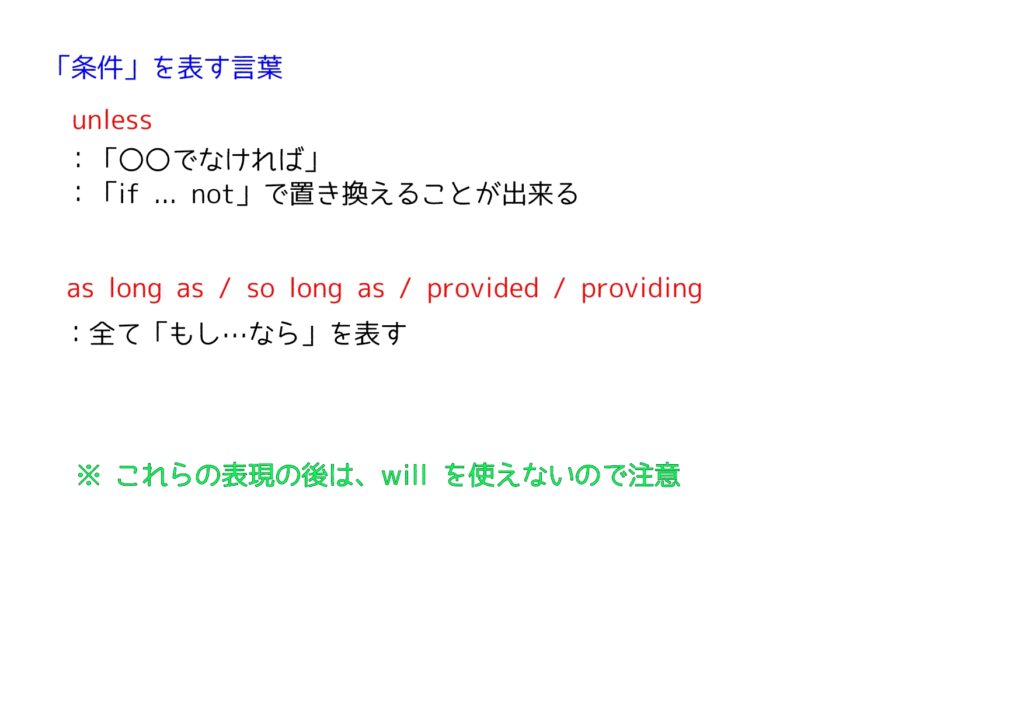第86回:「unless」・「whether」という言葉の使い方。

もちろん、「if … not ~」という表現を使う場合もあります。
Q. この記事で、一番大事なことって何?
A. 大事なことを、1枚の画像にまとめました。

いちいちノートにまとめるのが面倒だという方、また、
ノートにまとめることが苦手だという方は、ご活用ください。

[広告]
確かな英語力は、日々の継続から。
その継続を後押しする、第二言語習得理論に基づいた
オンライン英語学習プログラムがあります。
英語を使う人のための、確実なスキルアップが望める
7日間の無料体験はこちらから!

「if … not ~」・「unless」・「whether」の使い方
- もし…でなければ(if not)と、…でない限り(unless)
unlessは「もし…でなければ」という意味で条件文で使用されます:
You can’t travel on this train unless you have a reservation.(予約がない限り、この列車に乗ることはできません。)
unlessは未来について話すときには現在形を使います:Unless it rains, I’ll pick you up at six.(もし雨が降らなければ、6時に迎えに行きます。) - 現実的な条件文では、unlessまたはif … notを同様の意味で使用することがよくあります:
Unless the theatre is able to raise £100,000, it will have to close.(もし劇場が10万ポンドを集められなければ、閉館することになります。)
ただし、以下のような場合には、if … notを使い、unlessは使いません。
- if節で予想外のイベントや行動を主節で述べる場合:
I’ll be amazed if Christie doesn’t win.(もしクリスティーが勝たなかったら、私は驚きます。) - 質問文で通常はifを使います:
If you don’t pass the test, what will you do?(もし試験に合格しなかったら、あなたは何をしますか?) - ‘only if(〜ならば)’の意味が適用されない場合にif … notを使用します。
If it wasn’t the best performance of Hamlet I’ve seen, it was certainly the strangest.(これが私が見たハムレットの最高の演技でなかったとしても、確かに最も奇妙なものでした。)
非現実的な条件文では、通常はunlessではなくif … notを使用します:
If I weren’t so tired, I’d give you a hand.(もし私がそんなに疲れていなければ、手伝ってあげるのに。)
ただし、unlessは主節が否定形の場合に非現実的な条件文で使用されることがあります:
She wouldn’t have gone to university unless her parents had insisted.(彼女は両親が強く言わなければ大学に行かなかっただろう。)
- もし…かどうか(if and whether)
もし(if)やかどうか(whether)は、2つの可能性が話し合われたり考えられたりしていることを示すために使用されます。また、人々が何かについて確信がない場合にも使用されます:
They couldn’t decide if/whether it was worth resitting the exam.(彼らは試験を再受験する価値があるかどうか決められませんでした。)
Do you know if/whether Ben’s at home?(ベンが家にいるかどうか知っていますか?)
whetherは通常すぐにor notを続けることができます。例:
I didn’t know if Aya was coming or not.(アヤが来るかどうかは知りませんでした。)
I didn’t know whether or not Aya was coming.(アヤが来るかどうかは知りませんでした。)
- ifよりもwhetherを使う場合
- 前置詞の後(ifは非公式な場合もあります)とto-infinitiveの前にwhetherを使用します:
We argued about whether butter or margarine was better for you.(私たちはバターとマーガリンのどちらが健康に良いかについて議論しました。)
I couldn’t decide whether to buy apples or bananas.(リンゴを買うかバナナを買うか迷っていました。) - ‘名詞 / 形容詞 + as to whether’の形式でwhetherを使用します。これは「〜について」という意味です:
There was some disagreement as to whether he was eligible to play for France.(彼がフランス代表でプレーする資格があるかどうかについて、意見の相違がありました。)
他にも、conflict, confusion, debate, discussion, doubt, question, speculation, uncertainty, concerned, indifferent, uncertain, undecided, unsureなどの単語の後にwhetherを使います。
また、次の場合はifよりもwhetherを使用します:
- advise, choose, consider, depend on, discuss, talk about, think aboutなどの動詞の後:
You should consider whether the car you are interested in is good value.(あなたが興味を持っている車が適切な価値があるかどうか考えるべきです。) - 主語や補語として機能する節の前:
Whether the minister will quit over the issue remains to be seen.(大臣がその問題で辞任するかどうかはまだわかりません。)
The first issue is whether he knew he was committing a crime.(最初の問題は、彼が自分が犯罪を犯していることを知っていたかどうかです。)
以上のように、ifとunlessの使い方や、ifとwhetherの使い分けなど、条件文や疑問文での適切な表現方法について理解することが重要です。
具体例
- If… not and unless:
- Unless you finish your homework, you won’t be allowed to go out with your friends.
- You can come with us unless you’re not feeling well.
- I won’t believe it unless I see it with my own eyes.
- If… not and unless in real conditional sentences:
- If it’s not raining tomorrow, we can have a picnic in the park.
- Unless she calls me, I won’t know if she’s coming to the party.
- What will you do if you don’t get the job?
- If and whether:
- I can’t decide if I should go on vacation or stay at home.
- Do you know whether Sarah is coming to the meeting?
- They were debating whether to invest in stocks or bonds.
- Whether and if in different contexts:
- There’s a lot of confusion as to whether the new policy will be implemented.
- I’m indifferent as to whether we have pizza or pasta for dinner.
- The question is whether we should continue the project or cancel it.
Additional examples:
- The conflict arises as to whether the company should expand its operations or focus on improving existing ones.
- The discussion centered around whether the team should hire a new coach or stick with the current one.
- She was uncertain as to whether she should accept the job offer or wait for a better opportunity.
- There is speculation as to whether the price of housing will continue to rise or stabilize in the coming months.
- The committee is still undecided as to whether they should approve the budget proposal or make further revisions.
[広告]
TOEICのスコアを上げたいけれど、
まとまった勉強時間が取れなくて困っている…
なら、細かいスキマの時間を使いながら、
少しずつスキルを積み重ねてみてはどうでしょう。
スマホ1つでスコアアップが出来る、
オンライン講座のリンクはこちらから。

Q. この文法はどうやって使うのでしょうか?
A. 今回の文法を活用した会話文を見てみましょう。

Do you think we should go to the beach tomorrow?
(明日、ビーチに行くべきだと思う?)

Well, unless the weather forecast predicts rain, I’m up for it.
(まあ、天気予報で雨じゃなければ、行きたいな。)

If it’s not raining, we can definitely go.
(もし雨が降っていなければ、絶対に行けるよ。)

True, but if it turns out to be a stormy day, we might have to change our plans.
(そうだね、でももし嵐だったら、計画を変えなければならないかもしれない。)

I’ll be disappointed if we can’t go to the beach.
(ビーチに行けなかったらがっかりするな。)

I understand. Let’s check the weather tomorrow morning to be sure. If it’s not suitable for the beach, we can come up with an alternative activity.
(分かるよ。明日の朝、天気をチェックしよう。ビーチに適さないなら、代わりのアクティビティを考えよう。)

Sounds like a plan. Whether we go to the beach or not, we’ll make the most of the day.
(いいね、それでいこう。ビーチに行くかどうかに関わらず、一日を最大限に楽しもう。)
[広告]
ロゼッタストーン・ラーニングセンターで、最先端の教育制度を活用して英語を学びませんか?私たちは個々の学習ペースに合わせてeラーニングと対面教育を組み合わせ、柔軟な学習環境を提供しています。自宅でのeラーニングと対面教育のメリットを最大限に活かし、あなたの英語学習をサポートします。最新のテクノロジーと個別の指導が組み合わさった当センターで、自由な学習スタイルを体験してみませんか?英語学習を楽しく効果的に進めるための環境がここにあります。新たな一歩を踏み出して、新しい英語学習の旅に参加しましょう!

Q. この記事の要点は?
A. 「もし〇〇でないなら〜」という表現の活用について確認しました。
If not and unless; if and whether; etc.
- If… not and unless:
- “Unless” is used in conditional sentences with the meaning “except if.”
- Present tenses are used with “unless” when talking about the future.
- In real conditional sentences, “unless” and “if … not” can often be used interchangeably.
- However, “if … not” is used when the main clause expresses unexpectedness or in questions.
- “If … not” is also used when the “only if” implication doesn’t apply.
- In unreal conditional sentences, “if … not” is usually preferred over “unless.”
- If and whether:
- “If” and “whether” can be used to indicate that two possibilities have been considered or that uncertainty exists.
- “Whether” can be followed by “or not” immediately.
- “Whether” is used after prepositions and before a to-infinitive.
- “Whether” is preferred after verbs like advise, choose, consider, depend on, discuss, talk about, and think about.
- “Whether” is used in a clause acting as a subject or complement.
Note: “If” and “whether” can often be used interchangeably, but there are specific contexts where one is preferred over the other.
英会話を始めてみたいけれど、どのサービスが良いか分からない…
そんな方は、まず、この記事で3つのサービスを比べてみてはいかがでしょうか?
英語力を効率良く伸ばすことができるサービス3選です。

次回の文法解説は?
思っていることを繋げるための表現集。
この記事を作る際に参考にした文法の解説書になります。
すべて英語で書かれていますが、練習問題が付いてます。
イギリス英語なので、スペル等の表記が異なる部分もありますが、
「使い方を練習したい」「繰り返し問題を解きたい」
という方は、使ってみても良いかもしれません。

関連記事一覧
他の文法解説記事を検索できます。






-320x180.jpg)





コメント